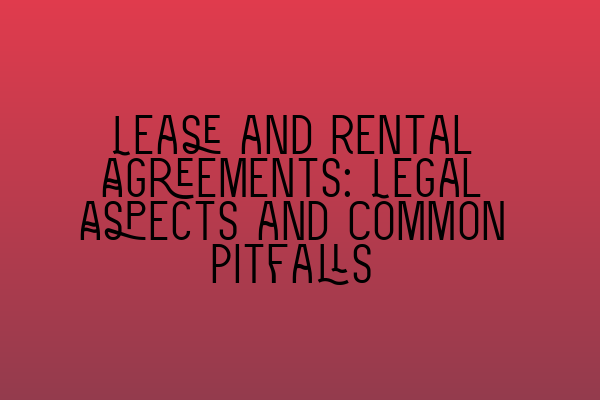Lease and Rental Agreements: Legal Aspects and Common Pitfalls
When it comes to renting or leasing a property, having a solid lease agreement is crucial for both landlords and tenants. A lease agreement is a legally binding contract that outlines the terms and conditions of the rental arrangement. It is designed to protect the rights and interests of both parties, ensuring a smooth and fair rental experience.
In this article, we will explore the legal aspects of lease and rental agreements, highlighting common pitfalls that individuals should be aware of. Whether you are a landlord or a tenant, understanding the legal framework surrounding these agreements can help you make informed decisions and protect your rights.
The Importance of a Well-Drafted Lease Agreement
A well-drafted lease agreement sets clear expectations for both parties and helps prevent potential disputes or misunderstandings down the line. It addresses crucial aspects of the rental arrangement, such as the duration of the lease, rent payment terms, security deposit, maintenance responsibilities, and more.
Having a comprehensive lease agreement in place provides legal protection for both landlords and tenants. It ensures that the rights and obligations of each party are clearly outlined, making it easier to handle any disputes that may arise during the tenancy.
It is important to note that a lease agreement should comply with all relevant laws and regulations in your jurisdiction. Working with a solicitor who specializes in contract law can help you ensure that your lease agreement is legally sound and enforceable.
Common Pitfalls in Lease and Rental Agreements
While lease agreements are meant to protect the interests of both parties, there are common pitfalls that individuals should be mindful of. Understanding these pitfalls can help you navigate the rental process and avoid potential legal issues.
1. Grey Areas and Ambiguities: It is crucial to be clear and precise in the wording of your lease agreement. Ambiguities or vague terms can lead to disputes and confusion. Ensure that the agreement clearly addresses all relevant aspects of the tenancy, leaving no room for interpretation.
2. Failure to Include Important Terms: A lease agreement should address essential aspects such as rent payment terms, maintenance responsibilities, rules regarding pets, subletting, and termination conditions. Failure to include these terms can result in disagreements or legal complications.
3. Non-Compliance with Legal Requirements: Each jurisdiction has specific laws and regulations that govern rental agreements. It is essential to stay updated with these legal requirements to ensure compliance. Failing to do so can render your lease agreement unenforceable and may lead to legal consequences.
4. Lack of Proper Documentation: It is crucial to have all agreements and amendments in writing. Verbal agreements can be difficult to prove in case of disputes. Ensure that any changes or modifications to the lease agreement are documented and signed by both parties.
5. Ignoring Due Diligence: Both landlords and tenants should conduct their due diligence before entering into a rental agreement. This includes thorough background checks, verifying references, and inspecting the property to ensure that it meets the required standards.
By being aware of these common pitfalls, you can proactively address them in your lease agreement and reduce the risk of future legal issues.
Seeking Legal Advice
Lease and rental agreements involve complex legal considerations. It is always advisable to seek legal advice from a qualified solicitor who specializes in contract law. They can guide you through the process, ensuring that your rights are protected and that the lease agreement aligns with the applicable laws and regulations of your jurisdiction.
If you found this article helpful, you may be interested in reading these related articles:
- Unveiling Real-Life Case Studies: Insights into Legal Practice and Decision-Making
- Exploring Solicitor Salaries in the UK: Average Earnings and Factors Affecting Income
- Mastering Client Relationship Management: Skills for Solicitors to Enhance Trust and Loyalty
- Pursuing a Law School Education in the UK: Choosing the Right Path for Your Future
- Securing Training Contracts: A Roadmap to Becoming a Solicitor
Remember, a well-drafted lease agreement is essential for safeguarding your rights and ensuring a smooth rental experience. By understanding the legal aspects and avoiding common pitfalls, both landlords and tenants can enjoy a mutually beneficial and lawful tenancy.
If you have any questions regarding lease or rental agreements, please feel free to get in touch with SQE Contract Law. Our team of experienced solicitors is here to assist you.

Lease and Rental Agreements: Legal Aspects and Common Pitfalls
by
Tags: